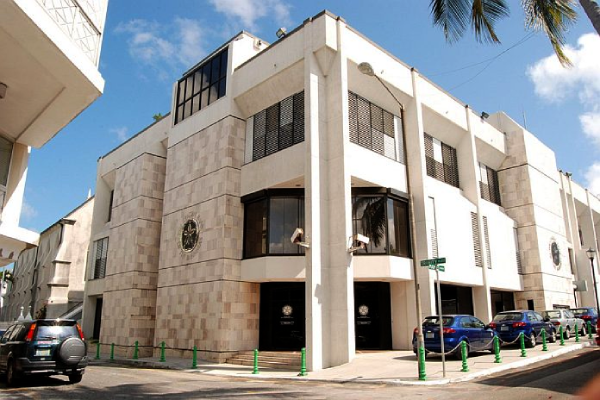


The need to modernise The Bahamas’ payments systems was acknowledged by the Central Bank of The Bahamas since the late 1990s when the Bank commissioned a special study to identify the available options for The Bahamas and to assist with the initial formulation of a strategy. Although the existing system was working adequately, modernisation was considered necessary in order to bring the domestic payments systems up to international standards and to serve the development needs of all sectors of the economy.
The Bahamian Payments Systems Modernisation Initiative (PSMI) is directed by the National Payments Council (NPC), established in 2003, after an extensive survey of the economy’s needs and expectations for banking and retail transactions (Phase 1). The NPC formally broadened ownership of the modernisation process to the clearing banks, and collaborated closely with the Government and public corporations, as they are important stakeholders in the payments systems.
In 2004 to automate the payments settlements process among the clearing banks (commercial banks), the Central Bank invested directly in the start-up of the Bahamas Interbank Settlement System – the real-time gross settlement (RTGS) system for large-value payments between clearing banks. The Central Bank then promoted efforts to establish the commercial bank owned, Bahamas Automated Clearing House (BACH) in 2010, for electronic settlement of small-value retail payments.
The ACH and RTGS have improved the speed and efficiency of domestic payments. They have supported the development of electronic point of sale payments at the retail level, including use of debit cards; and added to the efficiency and speed of cheque processing, with an intentional and evident trend in favour of increased use of wire transfers over cheques. Fiscal policy has also helped, as in July 2013, the Government removed the stamp tax on Bahamian dollar electronic funds transfer or debits. Only cash withdrawals and cheque writing still attract stamp tax.
The (PSMI) of which Project Sand Dollar is a recent component, targets collectively improved outcomes around financial inclusion and access, making the domestic payments systems more efficient, non-discriminatory in access to financial services across the entire archipelago. The main goals are:
The positive outcomes are also explicitly aimed at strengthening national defences against money laundering and other illicit ends, including activities that thrive in cash-intensive environments. More universally enabled access to electronic payments and to digital financial services also dovetails with the strategy to deliver government services through digital channels, thereby improving tax administration and increasing the efficiency of spending.
The Central Bank undertook a rigorous process to select a technology solutions provider for the design and implementation of the digital fiat for The Bahamas. The search process stressed a need for a robust solution that addressed both the archipelagic and infrastructural challenges of providing electronic financial services. It also called for a solution that was robust against international regulatory standards.
The Expression of Interest (EOI) issued by the Central Bank generated an overwhelming response, with submissions by thirty local and international firms. The Bank invited six of these firms to submit a formal proposal.
In March 2019, NZIA Limited was selected as the preferred solutions provider. The partnership was formalised with an official contract signing in May of the same year. NZIA Limited brings together the collective know-how and expertise of IBM, a leader in enterprise blockchain, along with Zynesis Pte. Ltd., a Singapore-based software development company specialising in blockchain solutions.
In November 2019, a special session of the National Payments Council (NPC) convened with key stakeholders to reaffirm the approach to the project, with emphasis on KYC standards for onboarding, zero cost carve out for the P2P payments, and outlines of the intended regulatory standards on data protection.
On 27th December 2019 the Exuma pilot launched, with an expansion to Abaco on 28th February 2020.
About the Pilot - Why Exuma
Given that Exuma comprises of Great Exuma and its surrounding cays, Central Bank felt that it best represents the greater configuration of the Bahamas, which makes it the optimal site to begin pilot testing before scaling up operations to the entire country.
In the Summer of 2019, the Central Bank also conducted a targeted baseline survey on financial inclusion and access for Exuma, alongside new data for the rest of The Bahamas. The results also highlighted room for increased use of digital financial transactions once costs, ease of use and cybersecurity concerns are addressed.
The Exuma results underscore high access to basic bank accounts by 93% of the island’s residents. Additionally, the Exuma survey indicates that some two-thirds of bank accounts receive deposits that originate from salary payments, and about 15% receive pension payments. Where bank accounts were not used, lack of trust in the institutions or the inconvenience of getting to a bank were the most cited reasons for self-exclusion (collectively for 17% of those without accounts).
About 96% of surveyed Exumians own mobile devices, and about 40% use these to perform some forms of bill payments or online banking transactions. Close to two-thirds of respondents disclosed a willingness to use mobile devices for payments or commercial transactions in the future. When disclosed, there was a reluctance to use electronic banking and financial transactions, which was skewed more toward older respondents, and mostly reflecting unease or distrust with electronic platforms, including cybersecurity concerns.
About the Pilot - Abaco Expansion
The Central Bank acknowledged the importance of promoting the restoration of Abaco’s financial system, through early deployment of the digital currency on the island and keys. This commenced in February 2020 with an expansion of the Sand Dollar pilot. The Abaco setting tests emergency wireless communications features that would enable rapid financial services recovery following natural disasters; and connect with the island’s retail businesses early in their recovery process
On 20th October 2020 the Central Bank of The Bahamas took Sand Dollar from pilot to production in a national rollout, which made the central bank digital currency available to the general public.